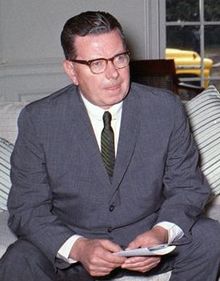Richard J. Hughes
Richard Joseph Hughes (born August 10, 1909 in Florence , Burlington County , New Jersey , † December 7, 1992 in Boca Raton , Florida ) was an American politician and governor of the state of New Jersey from 1962 to 1970 .
Early years and political advancement
Richard Hughes studied at St. Charles College in Catonsville , Maryland and St. Joseph College in Philadelphia . Originally, he wanted to be a Catholic priest, but changed his mind and studied law at the New Jersey Law School until 1931 . After his admission to the bar in 1932, he began working in his new profession in Trenton .
Between 1939 and 1945 he was the assistant federal attorney for New Jersey. Hughes became a member of the Democratic Party , whose party leadership he took in 1945 in Mercer County . From 1948 to 1952 he was a judge on an appeals court in that county. Since 1952 he was a judge in a high court in his state and was considered a candidate for a judge's position on the Supreme Court of New Jersey. Hughes preferred to return to work as a private lawyer in 1957. In November 1961 he was elected as the new governor of his state, with 50.4 percent of the vote he narrowly prevailed against the Republican James P. Mitchell , the former US Secretary of Labor .
Governor of New Jersey
Richard Hughes took up his new office on January 16, 1962. After re-election in 1965, he could remain in office until January 20, 1970. Thanks to his friendship with President Lyndon B. Johnson he was able to bring a Democratic National Convention to New Jersey for the first time, which then took place in Atlantic City in late August 1964 . His tenure was overshadowed by civil unrest related to the civil rights movement . The governor campaigned for social reforms to remove the base of the unrest. At the same time, however, he defended the sometimes harsh actions of his police on the occasion of the riots in Jersey City and Paterson . Between 1963 and 1965, Hughes was chairman of the National Governors Association and served on a committee to oversee the elections in South Vietnam .
Another résumé
After the end of his tenure, Hughes was initially again a lawyer. In 1968 and 1972 he was a delegate at the national party congresses of the Democrats. From 1973 to 1979 he was the Chief Justice of his state . During his tenure, his court ruled that was highly controversial in the United States at the time. The issue was the euthanasia permit, which the court allowed in the case of a coma patient named Karen Ann Quinlan .
After reaching the age limit of 70 years Hughes resigned from the office of Chief Justice in 1979. After that he worked as a lawyer again. He died in December 1992. Governor Hughes was married twice and had a total of ten children, some of whom work in New Jersey as local politicians and lawyers.
Web links
- Richard Hughes in the National Governors Association (English)
- New Jersey State Library ( Memento from March 29, 2009 in the Internet Archive ) (English; PDF file; 547 kB)
- Richard J. Hughes in the database of Find a Grave (English)
| personal data | |
|---|---|
| SURNAME | Hughes, Richard J. |
| ALTERNATIVE NAMES | Hughes, Richard Joseph (full name) |
| BRIEF DESCRIPTION | American politician and governor of the state of New Jersey (1962–1970) |
| DATE OF BIRTH | August 10, 1909 |
| PLACE OF BIRTH | Florence , Burlington County , New Jersey |
| DATE OF DEATH | 7th December 1992 |
| Place of death | Boca Raton , Florida |

